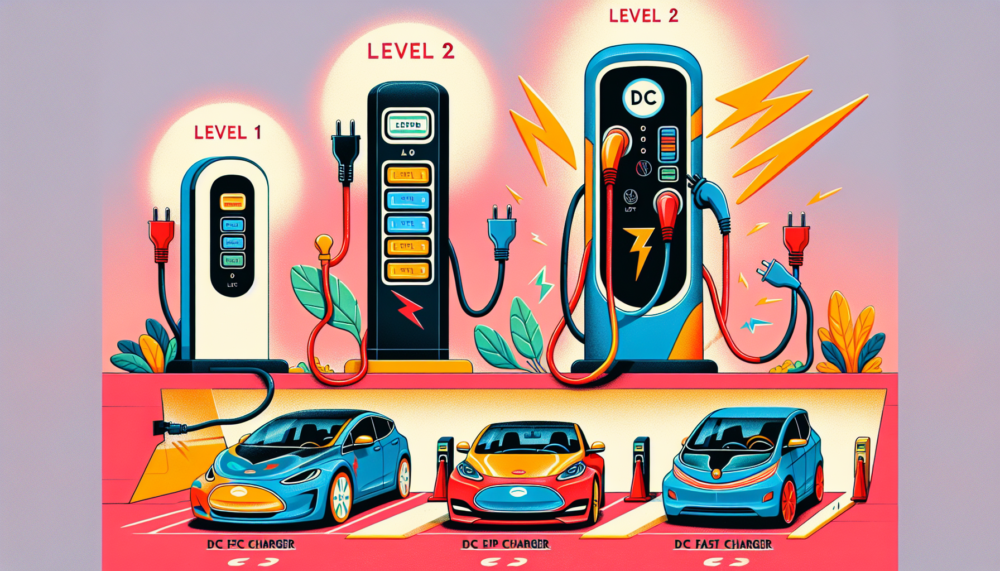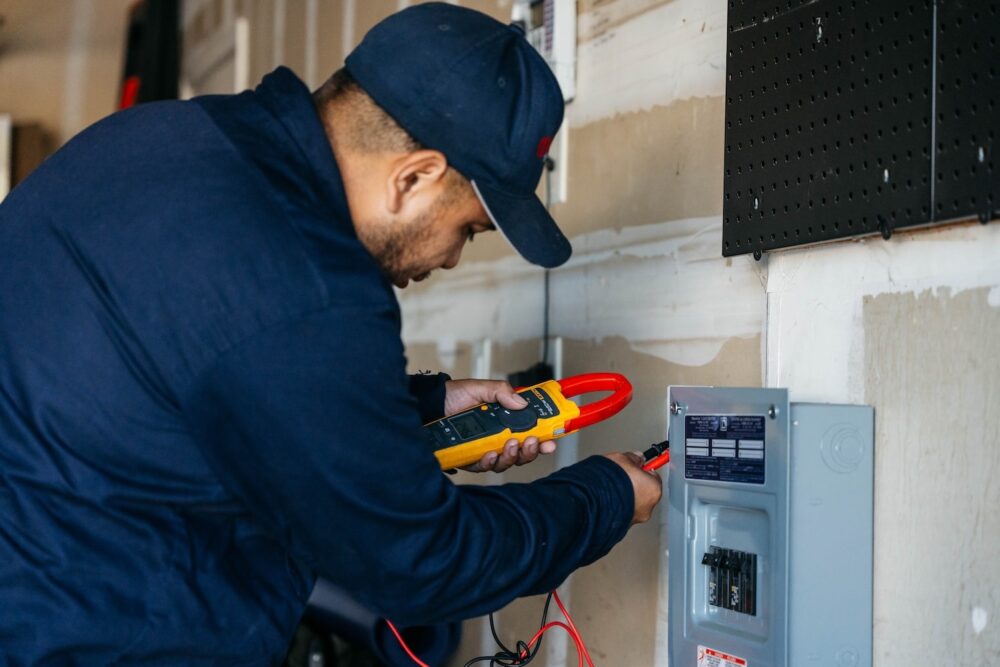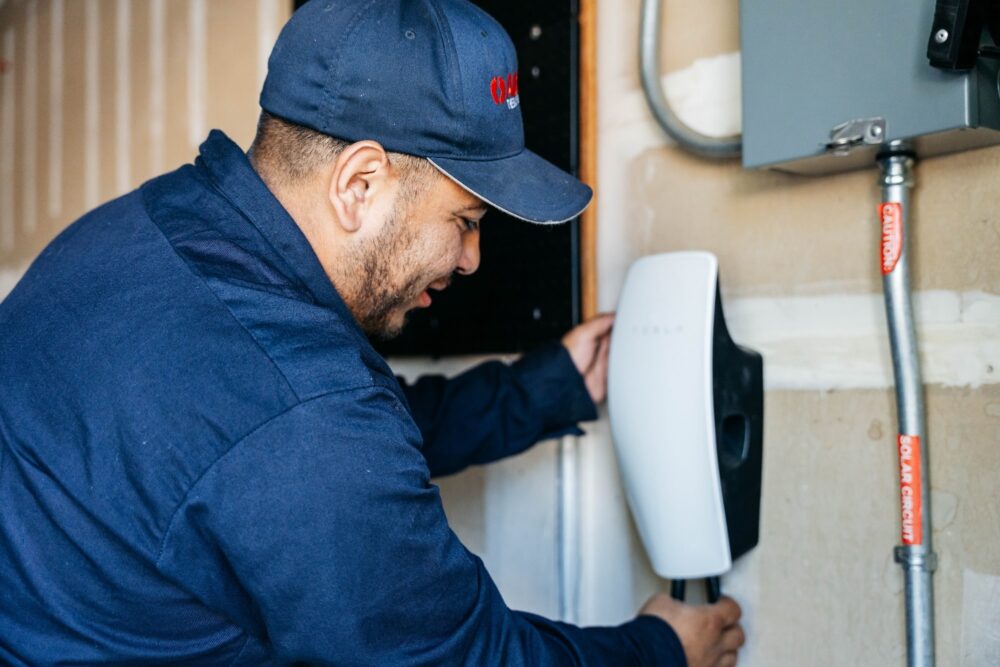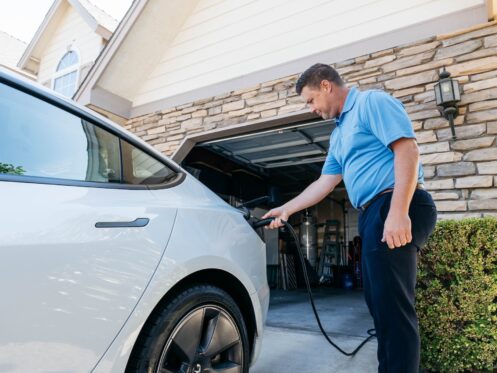Looking for trusted EV charger installers to set up your EV charging station safely and efficiently? In this article, we’ll explore different types of EV chargers, walk you through the installation process, and help you choose the best installer for your needs.
Key Takeaways
- There are three main categories of EV chargers: Level 1, Level 2, and DC Fast Chargers, each with distinct characteristics and installation requirements.
- The EV charger installation process involves a site assessment, obtaining permits, performing the installation, and conducting thorough testing to ensure compliance with safety standards.
- Hiring a certified installer is crucial for safe and efficient EV charger installations, ensuring compliance with regulations and optimizing the investment.
Types of EV Chargers and Installation Requirements

Illustration of different types of EV chargers including Level 1, Level 2, and DC Fast Chargers.
There are three main categories of EV chargers: Level 1, Level 2, and DC Fast Chargers. Each type of charger has distinct characteristics and installation requirements, so selecting the right one based on your needs is crucial. The installation process usually includes a thorough site assessment to evaluate the electrical system’s capacity and select an appropriate charger, ensuring all safety and compliance standards are met.
Understanding the different types of EV chargers helps in making an informed decision. Here’s a closer look at each type and their installation details.
Level 1 Chargers
Level 1 chargers are the most basic type of EV chargers, using a standard 120V outlet to provide a charging speed rate of about 5 miles per hour. This makes them suitable for short daily commutes and for those who don’t drive long distances regularly. While the charging process is slower compared to other types, Level 1 chargers can be incredibly convenient for overnight charging at home.
Working with an electrician for installing Level 1 chargers ensures safety and compliance. Charging at a slower rate with Level 1 chargers can extend the lifespan of EV batteries by up to 20%, making them a practical option for everyday use.
Level 2 Chargers
Level 2 chargers are a step up from Level 1, offering significantly faster charging times. These chargers require a 240V outlet, which allows them to charge an EV much quicker, typically in about 4 to 8 hours. This makes Level 2 chargers a popular choice for both home installations and commercial settings in the Central Valley.
Installing Level 2 chargers involves confirming the electrical system can handle the higher voltage and power requirements. This often means working with a professional to install the necessary wiring and outlets. The investment in a Level 2 charger can pay off in terms of convenience and efficiency, making it a worthwhile consideration for many EV owners.
DC Fast Chargers
DC Fast Chargers, also known as Level 3 Chargers, are the fastest option available, capable of charging an electric vehicle in around 30 minutes. These chargers are designed for rapid charging, making them ideal for public charging stations and commercial use. However, their installation is more complex and generally requires professional assistance to meet safety and regulatory standards.
The high power output of DC Fast Chargers can quickly charge an EV, but it also means that the electrical system needs to be robust and capable of handling the load. Consequently, the installation process is more complex and often requires significant infrastructure upgrades.
Steps in the EV Charger Installation Process
Installing an EV charger involves several key steps to ensure a safe and efficient setup. These steps typically include a site assessment, obtaining permits, the actual installation, and final testing. Each step ensures the installation meets all safety and compliance standards.
First, the site’s electrical capacity and proximity to the proposed charger location are evaluated. Next, the necessary permits are obtained, ensuring compliance with local building codes. After these preliminary steps, the installation takes place, followed by thorough testing to ensure proper functioning.
Site Assessment
During the site assessment, the installer evaluates the best location for the charger, considering factors such as the distance from the electrical panel and local regulations. A proper load calculation is essential before installation to assess whether the existing electrical system can handle the additional demand.
In many cases, existing electrical infrastructure, especially in older buildings or rural areas, may lack the capacity to support high-powered EV chargers and electrical vehicle charging needs. This step identifies any necessary upgrades to the electrical system for safely handling the new charger.
Permitting and Compliance
Obtaining the necessary permits can significantly influence the installation timeline. Verifying local building codes and securing permits are crucial steps before commencing access installation. Adhering to local building codes ensures the legality of the installation and prevents potential legal issues.
Professionals’ in-depth knowledge of regulatory compliance can prevent costly delays and legal issues during installation. Handling the permitting department process ensures the installation proceeds smoothly and meets all necessary standards.
Installation and Testing
The installation phase includes detailed electrical work to connect the charger to the power supply. This involves ensuring all connections meet safety standards and the charger is properly integrated into the electrical system.
After installation, a licensed electrician conducts tests to ensure the charger functions correctly and complies with safety standards. This final testing phase is crucial to confirm that the charger operates correctly and meets performance standards.
Key Considerations for Businesses Installing EV Chargers

Allbritten Electrician testing home’s electrical before installing EV charger
Installing EV chargers can offer businesses numerous benefits but requires careful planning and consideration. User accessibility can be improved by placing chargers in high-traffic locations and integrating features like mobile apps for station navigation. Level 2 chargers, which can charge an EV in about 4 to 8 hours, are often suitable for commercial settings.
Working with an EV charging solutions provider can simplify the installation process and address ongoing management needs. Certified installers can maximize financial incentives and ensure compliance with cost-saving requirements.
Aligning EV charger installation with business goals can enhance sustainability efforts and improve customer and employee satisfaction.
Benefits of Installing EV Chargers at Home
Installing an EV charger at home offers numerous advantages such as convenience, cost savings, and increased property value. Home EV chargers allow users to charge their vehicles overnight in the garage, providing convenience and eliminating the need for public stations.
Home EV chargers can be more economical than public options, especially when utilizing renewable energy sources like solar or wind. Additionally, an EV charger can enhance a home’s value, making it more appealing to prospective buyers, especially Millennials.
Choosing the Right EV Charger Installer

Electrician installing Tesla EV Charger
Hiring a certified EV charger installer with proper training and experience can prevent unsafe installation and potential hazards. DIY installations for EV chargers are not recommended due to complexity and safety risks; professional installation is advised.
Ensure the installer is EVITP certified, indicating they have completed specific training for EV charger installations. Look for installers with good online reviews and testimonials, as these can indicate a reliable and trustworthy contractor.
Why Choose Professional EV Charger Installers?
Employing specialists ensures EV charger installations align with safety, quality, and efficiency standards. Reliable electricians follow stringent protocols to ensure all installations meet safety and compliance regulations.
Professional electricians discuss optimal charger types and installation processes tailored to individual needs. Well-trained electricians can provide tailored solutions that anticipate future needs, optimizing investment and operational efficiency.
Common Challenges and Solutions in EV Charger Installation
EV charger installations often face challenges related to electrical capacity, site suitability, permitting issues, and building code compliance. Common issues include inadequate electrical capacity, which may not support the additional load required by the EV charger, leading to potential service interruptions.
Resolving electrical capacity issues involves conducting a thorough assessment of the existing electrical system and making necessary upgrades. Addressing site suitability challenges involves engaging a professional for a site assessment to ensure optimal location and necessary modifications for installation.
Contact Allbritten for your EV Charger Installation
In summary, understanding the types of EV chargers and the installation process is crucial for both homeowners and businesses. The benefits of professional installation, such as safety, compliance, and efficiency, cannot be overstated. Whether you’re looking to install a charger at home or within a commercial setting, the right approach and professional help can make all the difference.
Ready to take the next step towards a more sustainable future? Contact Allbritten for expert electrical services, including EV charger installation. Our certified professionals ensure your installation is handled with the utmost care and precision, guaranteeing the best results. Embrace the change and let Allbritten help you make a seamless transition to electric vehicle charging.
Frequently Asked Questions
What are the main types of EV chargers?
The main types of EV chargers are Level 1, Level 2, and DC Fast Chargers. Each type offers different charging speeds and is suitable for various needs and scenarios.
How long does it take to charge an EV with a Level 1 charger?
Charging an EV with a Level 1 charger typically takes about 20 hours for a full charge. This may vary based on the vehicle’s battery capacity and current charge level.
Why is a site assessment important before installing an EV charger?
A site assessment is crucial as it evaluates the existing electrical infrastructure to confirm it can support the EV charger’s demand and determines the optimal installation location. This proactive step helps avoid potential operational issues and ensures a successful setup.
What are the benefits of installing an EV charger at home?
Installing an EV charger at home provides the convenience of charging your vehicle overnight, resulting in cost savings compared to public charging. Additionally, it can enhance your property’s value, making it a smart investment.
Why should I hire a professional EV charger installer?
Hiring a professional EV charger installer guarantees safety and adherence to regulations, while also delivering customized solutions to meet your specific requirements. This expertise can save you time and potential issues in the long run.


